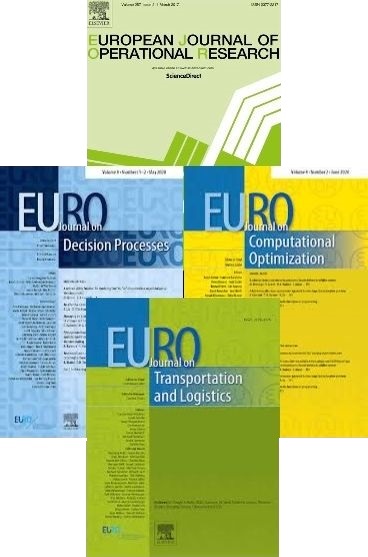EURO Prize for OR for the Common Good (Guidelines)
Policy
The EURO Prize for OR for the Common Good is a recognition for making an outstanding contribution to addressing global challenges through the application of OR. It also aims to encourage the use of OR for the common good, and to raise awareness of the important role OR can play in contributing to global challenges such as the UN Sustainable Development Goals. The competition will run every 3rd year. If there is a suitable recipient, the winner will be announced by the chair of the jury during the closing session of a EURO-k Conference.
Award
The jury selects a short-list of finalists who will present their work in a special session of the EURO-k Conference. There is no registration fee for one representative of each of the finalist presentations. The prize for the winners is a distinct honour, and in material terms consists of a certificate of OR for the common good for the representatives of work selected as the winner of the competition. Furthermore an amount of €3,000 is shared between the representatives.
Eligibility
All interested candidates are invited to submit a detailed description of an application of OR with a real impact on society for the common good. The work should have original features, whether in methodology, application or implementation. This may be in the form of a paper written for publication (although not necessarily published at the time of submission), a client report, or other appropriate documentation.
Applications
All applications should be submitted online by the due date set in the announcement.
The documentation must describe the work in a way which illustrates how it meets the criteria outlined below. The age limit for published papers is four years. The work must not have been submitted concurrently to another competition. The application is open to OR specialists from any part of the world.
Selection jury
The selection jury consists of five members of recognized stature in the OR community. The jury making process starts with a core of two members who serve normally a two prizes period, staggered so that one member is added at each prize. The new member is nominated by the EURO Executive Committee (suggestions will be asked to the jury core) and approved by the EURO Council. The chairperson is normally the member who is in the final year of service. The EURO EC then selects additionally three members serving only for the current prize in question and keeps the EURO Council informed about the decision. One of these additional members may be proposed by the award sponsor, where relevant.
Care should be taken to make sure that the selection committee includes members from both practice and academia, and is representative of the various areas of OR. In particular, it is important that no two or more members come from the same major OR area. The jury members must be members of one of the EURO member societies.
If any member of the award jury has a past or current relationship with a nominee that might influence the selection process for reasons other than the merits of the case relative to the award, it is the responsibility of each jury member to bring to the attention of the jury chair such a conflict of interest. The jury chair should propose a response that ensures that the final decision of the jury is exempt from any apparent conflict.
Selection Process
In the year prior to the relevant EURO-k conference the EURO Prize for OR for the Common Good jury will place a call for applications on the EURO website. The EURO Office will distribute the information to the EURO member societies and the EURO Working Groups. Four months prior to the EURO-k conference, the jury selects a short-list of finalists who are invited to present their work in a special session of the EURO-k Conference.
Only one award may be made on each occasion. The winner is determined by the jury at the end of the special session(s) (only one award can be made) and is announced by the chair of the jury at the closing session of the EURO-k Conference.
The criteria for the evaluation of the submissions are:
- the real impact on society for the common good,
- the scientific quality of the paper,
- the relevance to Operational Research,
- the appreciation by the organisation involved with the application,
- the originality in methodology, implementations and/or field of application.
Letters of appreciation by the organization involved with the application are important.
Time line for the EURO Excellence in Practice Award
| t - 2 years | Nomination of the new EPOCG jury core member by the Executive Committee. Approval of the new EPOCG jury core member by the EURO Council. |
| t - 1,5 year | Selection of additional jury members by the EURO Executive Committee. |
| t - 1 year | EURO Executive Committee keeps EURO Council informed about the additional jury members. Call for applications by EPOCG jury chair/EURO office. |
| t - 5 months | Deadline for applications. |
| t - 4 months | Decision of the jury, the jury chair informs the EURO Office. The EURO Office contact the finalists to inform them about the special session(s) and make arrangements for their registration. |
| t | EURO Conference: presentation by each finalist, final selection, award delivery. |
[Latest guidelines approved July 2024 (changed to schedule every 3 years and have 2 rather than 3 core members)]

This work is licensed under a Creative Commons Attribution-ShareAlike 3.0 International License and the GNU Free Documentation License (unversioned, with no invariant sections, front-cover texts, or back-cover texts).
